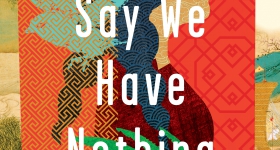In 1982, 2-year-old Hai-Dang Phan and his family arrived in America as political refugees fleeing from the aftermath of the war in Vietnam. In his debut poetry collection, Reenactments: Poems and Translations, Phan, the son of Vietnamese refugees, confronts his inheritance of Vietnam War history as a 1.5-generation Vietnamese American. Phan’s collection centers on the concept of reenactment — a recreated experience, a repeated performance, a translated act. Although Phan has no personal recollection of his family’s escape at sea and refugee camps, his poetic (and some translated) “reenactments” of the war navigate his readers through the irresolvable terrain of Vietnamese and American memories of the war-torn past.
Reenactment, however, does not always lead to an enlightened understanding of historical events or harmless empathy for those who suffered in war. Phan’s collection also explores a more sinister and unsettling side of reenactments. Drawing inspiration from An-My Le’s photographic series Small Wars (1999-2002), Phan embarks on a project of ekphrasis with the opening poems “Small Wars” and “A Brief History of Reenactment.” Le, a Vietnamese American photographer, spent three summers in Virginia and North Carolina capturing Vietnam War scenes, which a group of American men reenacted as a hobby. Le also participated in some of the reenactments, immersing herself in historically scripted yet personally mediated theaters of war. The speaker in both poems is a Vietnam War reenactor. In “Small Wars,” the speaker subtly moves between the real and artificial planes of the war scene; the men take turns playing Charlie or ultimately “play dead,” and hell breaks loose “as planned.” When one three-day war ends, they casually plan the next.
Phan elevates the significance of reenactments as historical events of their own in the carefully worded title of the poem “A Brief History of Reenactment.” While it would be more descriptive to say that the men are performing “brief reenactments of history,” switching “history” and “reenactment” authenticates reenactments as something real in their own right, with the feelings and actions in the moment worth recording and documenting. The literal reenactment of the war hovers on the brink of violence, which Phan intensifies by introducing An-My Le into the poem as a photographer who “shoots.” Le’s act of shooting contains, jarringly, the acts of photographing and killing. The enjambment in the line “She shoots us / at breakfast eating our C rations” dismisses photography as passive. When she “speaks of controlled light and the hole / that opens up when you press the shutter button,” the “hole” calls to mind gunshot wounds, no less dangerous although a camera does not come into direct contact with its target. The double meaning of “shooting” forces the reader to examine the tensions inherent in photography and reenactments of a destructive war, where death was not a game. Phan confronts the reader with the invasive and traumatizing nature of reenactments, which carry the destructive burden of the past with each performance.
Phan’s poetry collection lays bare the archival work that promptly facilitates his poetic reenactments. Phan's verse examines and adapts artifacts of the Vietnam War such as correspondence files, videos and phrase books in reconstructing historical experiences for the reader. His poems are rich vessels of Vietnam War material, and these archives are tagged by the poem’s title or subtitle, such as the name of a person or a city that originally carried the memories reenacted in the poem. For a moment, the processing of history seems accessible, a tangible task. Phan offers us insight into the poetic reenactor at work in the poem “Archive Fever”:
Last night dust storms
filled your sleep
with blinding debris —
letters from Amarillo,
the rustle of human voices,
bits of eros.
We imagine the speaker lost upon boxes of historical files, where dust, debris and letters are storming, “blinding” and rustling “with human voices” — the past restored to the present. Phan then compares the speaker to a “sundial” that searches for “that good shirt / you wear like someone else’s life.” A sundial measures the time of day by the pointer’s shadow, which the sun casts onto a plate. Through this simile, the poet acts as the pointer whose present existence anchors the remnants of history to a relative time point and interprets it. After bearing witness to history, the poet earns the creative license to wear the “good shirt” that is someone else’s lived experience. Phan wears these “good shirt[s]” in his collection of mimetic poems which are reenactments. The worthy task of recapturing the lost voices of history requires weathering the stormiest episodes of someone’s life in order to recover the pieces that have lost themselves in the storm or were left unearthed by some of the artists and historians who have come before. The sensory details in Phan’s poem of sight, sound and touch clarifies that the archival form of reenactments entails a reopening of the senses, where one comes awake and becomes aware of another human being’s past.
The worthy task of recapturing the lost voices of history requires weathering the stormiest episodes of someone’s life in order to recover the pieces that have lost themselves in the storm or were left unearthed by some of the artists and historians who have come before.
Phan also interrogates the concept of “reenactments” from his position as an interpreter of his own family’s wartime experience. Even as he explores the national histories of Vietnam and America, he does not neglect to write of the Vietnamese American experience that only he can reenact. His poem “My Father’s Norton Introduction to Literature, Third Edition (1981)” is the product of personal archiving. In the poem, the speaker (who is likely Phan) studies his father’s annotations in a literature textbook as if analyzing the marginalia of a famous author:
Its thin translucent pages are webbed with his marginalia,
graphite ghosts of a living hand, and the notes often sound
just like him: “All depend on how look at thing,” he pencils
after “I first surmised the Horse’s Heads / Were toward Eternity —”
His slanted handwriting is generally small, but firm and clear.
His pencil is a No. 2, his preferred Hi-Liter, arctic blue.
In this poetic narrative, the immigrant father’s broken English becomes secondary, while his commentary, a personal interpretation of American literature, presents itself “firm and clear” on the page. While many Vietnamese American writers have sketched the portrait of the war-torn father figure before, Phan presents a unique lens through which to examine a haunted father. In this case, the ghost is the 14-month-old daughter who died when the speaker’s father was in reeducation camp. Phan reconstructs a Vietnamese father’s trauma and resilience in the father’s literary analysis of Ransom’s “Bells for John Whiteside’s Daughter”:
Did the memory of those days sweep over him like a leaf storm
from the pages of a forgotten autumn? Lost in the margins
I’m reading the way I discourage my students from reading.
But this is “how we deal with death,” his black pen replies.
Assume there is a reason for everything, instructs a green asterisk.
A reminder of the immigrant father’s past and his brave adjustment to America concludes the poem when the speaker finds “a newspaper clipping … an old listing / from the 404-Employment Opps State of Minnesota” inside the textbook. The reader is invited to contemplate the personal histories of immigrant parents and the challenges they endured even beyond the struggle to learn English. This poetic reenactment of family history also allows the speaker to access traumatic memories that would be too painful for his parents to share casually with him, but are nevertheless central to his understanding of himself as an English professor and a son of Vietnamese immigrants.
Phan’s poems interlace inherited public history with personal history, where minoritized Vietnamese identities negotiate with the majority’s narratives of America and the war. He navigates the reader through reenactments in the form of archival research, family memories and literal war reenactments, renewing our physical and emotional connection to the past. Phan’s transparent archival touch elevates his poetic narratives and distinguishes him from other Vietnamese American poets who write about coming of age in a Western world.










Comments